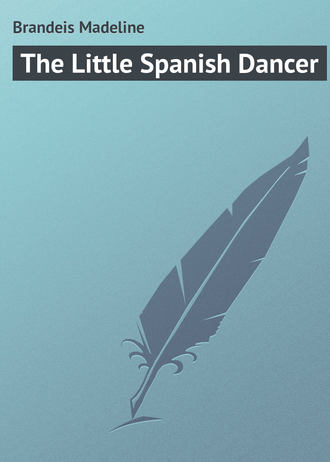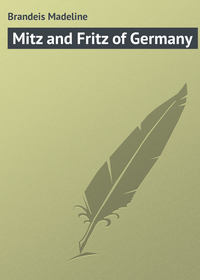 полная версия
полная версияThe Little Spanish Dancer
The Carmen of this story did not work in a cigarette factory. She was a dancer. But she, too, had an admirer who was a torero. His name was Pedro.
In a few days Pedro was going to fight in a most important corrida, or bullfight, in the city of Madrid. He was going to fight a very fierce and savage bull. But, strange to say, Pedro did not want to kill that bull.
Now, as a general rule, toreros would rather kill bulls than be killed by them, for which you cannot blame the toreros.
In this case, however, it was different. Pedro's father had raised this great bull, Rey, and Pedro was very fond of the animal. In a few days he was expected to go into the arena and kill his pet.
Often Pedro took his little friend Carmen to visit Rey, who lived in a field outside the city. Today they had come out for the last time before the famous bullfight was to take place.
Both were very sad. Carmen, too, had grown to love Rey, and the big creature seemed fond of her.
Sometimes the girl would practice upon her castanets out in the field. And always when Rey heard the clicking song of the instruments, he would come up close to the young couple and stand quietly listening.
Do you wonder that this was a sorrowful day in the lives of Carmen and Pedro?
"If only we could think of some way to save him!" sighed Carmen.
She and Pedro sat upon a fence in the field. Around them rose mountains, hazy in the sun. Small stone houses cuddled among old scrub oak trees.
Suddenly Pedro's eyes sparkled. "I have it!" he cried. "I have a plan! Do you remember the bull whose life was saved during a bullfight, because he came to his owner when he was called?"
Carmen nodded. She remembered well. All Spain had heard of it.
"Then why should not Rey, too, be given this chance?" asked Pedro. "Why should he not be spared if he answers a call?"
"But who will call him?" asked Carmen.
"You," answered Pedro. "You, with your castanets."
"Like this," said Carmen, and she started to play.
Softly she played, then more and more loudly, until the great bull appeared at the other end of the field. He stood looking at the boy and the girl and, all at once, he started toward them, like a big, friendly dog.
"You see!" exclaimed Pedro joyfully. "Now on Sunday, when I am fighting with him in the arena, you, from the audience, will play your castanets as you just did. If he turns and goes to you, I am sure that the judges will spare his life."
"This is a wonderful plan, Pedro," smiled the lovely little Carmen. "And I am certain that it will succeed, because, you see – " She hesitated for a moment. Then she continued, "Because these castanets are enchanted!"
"Enchanted?" Pedro laughed. "That cannot be! Yet when you play them, it is I who am enchanted, my Carmen!"
Carmen did not laugh, however. She looked down soberly at her castanets.
"Legends are told in our family," she said, "about the magic power of these castanets. Whenever one of us has lost or sold or given them away, misfortune has overtaken us."
Whereupon, she recited this verse:
"Castanets, with magic spell,Never lose or give or sell;If you do, then grief and strifeWill follow you through all your life.""Then whatever happens, do not lose them before next Sunday," warned Pedro, smiling.
As the young couple arose to go, Carmen gave a start.
"Did you see a figure sneak out from behind that tree and disappear?" she asked Pedro.
"No, I did not," he answered. "And you are full of mystery today, little Carmen!" He was laughing at her again. "Come. Let us go home now before you see a ghost."
But Carmen had been right. There had indeed been a figure behind that tree – someone with very sharp ears, who had listened to all they had said.
He was no mystery – this figure – but a very real person. He was another torero, jealous of Pedro, who had won the love of Carmen – jealous, too, because Pedro had won popularity as a fighter, while he had not.
Carmen thought she recognized this man. Yet she was not altogether sure, and on the way home, Pedro talked her out of her fears.
Happily they started toward Madrid, unaware of the terrible plan which this jealous torero was beginning to lay.
On they drove through a flat land of many vineyards. They passed small white houses with tiled hats on, and a village cut out of the landscape by a lazy hand and colored carelessly. Soon they entered Madrid.
Madrid is a modern city of tram cars and toots and traffic. In the summer time, Madrid is like a faded, old duchess, who clicks her fan and squats in the sun. She is dressed in handsome plazas, fountains, and parks.
But should you chance to walk into a narrow side street, you might catch Madrid in her alley mood. Then she is a simple peasant.
Madrid is the capital, center, and heart of Spain. Pedro, the torero, had lived there all his life. But little Carmen had only recently arrived in the big city.
Upon the Sunday of Pedro's great bullfight, Carmen awoke early. Her heart pounded with excitement. Today she and her magic castanets were to try to save the life of Pedro's beloved Rey.
But suppose Rey would not listen to her? Suppose he would not come to her when she played? The noisy arena would be far different from the quiet fields where she was accustomed to calling him. He would be frightened, furious, and fierce.
Bullfights do not start until four o'clock in the afternoon. Then the sun is getting ready to go to bed, and Spaniards are getting up from their siestas, or naps.
Carmen drove to the bullfight with Pedro's mother.
As they passed the Prado (prä´dō), Madrid's beautiful art gallery, Carmen thought, "This Prado is a heaven of art, while the corrida, only a few blocks away, is a hades of suffering!"
She began to worry. And what girl would not have worried? For no matter how brave a torero may be, it is never certain that he will come out of the arena alive. Why, even his own pet, might today take Pedro's life!
Through the many fine streets of Madrid they drove, and at last they reached the bull ring. Crowds were swarming in through the gates of the big, round arena. Carmen and Pedro's mother, silent and sad-faced, made their way to their box.
The old lady wore a tall comb in her hair and a lace mantilla over it. She opened her fan with a click and started to fan herself. Carmen did the same, as, indeed, everyone else was doing. The sun had been very slow about going to bed.
Over on the opposite side of the arena, the poor people sat in the sun, because those seats were cheaper. There was an air of excitement. The band played the "Toreador's (tŏr´ē̍-ä-dôr´) Song" from "Carmen," and then the fight began.
There were five toreros and five bulls before Pedro's turn came. Pedro was to be last on the program.
Everything seemed to swim before Carmen's eyes during the performances of these other men and bulls. The whole thing was a sea of fluttering fans, sickly blue light, and waving red cloaks.
Then at last Pedro entered the ring. How big and handsome he looked in his colorful costume! He carried the red cape with which he was going to tease the bull.
But before that time, the bull would first be angered by men with sharp sticks and by other men on horseback.
Look! The gate is swinging open now, and here is Rey! Snorting, rolling his fine eyes, the magnificent creature gallops into the center of the arena and stands, bewildered.
Suddenly Carmen cannot look to see her dear friend tortured. She hides her eyes, her delicate little white hands held in front of her face.
But when she hears the crowd yelling, "Pedro! Pedro! Olé! Olé!" she knows that she must uncover her eyes, for soon it will be her turn to act.
A cry from the crowd. The bull has charged and has caught young Pedro by the coat. But Pedro is quick. He finds his feet and twists himself to safety. The crowd cheers loudly.
Backward and forward he dances like a graceful reed, playing with the great beast, and the crowd are wild at his skill. Some throw their hats into the ring.
But Carmen sees the fury and the pain in Rey's eyes. He is wounded. He is frantic. She knows that now her turn has really come and she must call to him with her castanets. There is no time to lose.
Oh, will he remember those peaceful fields and come to her when she plays? For if he does, it has been arranged that he shall live.
But should he not, the end must be the same with Rey as with every other bull in every other fight. Pedro will have to plunge a dagger into the head of his friend.
"Oh, let us win!" prays little Carmen, and she opens her bag where she keeps her castanets.
The magic castanets are gone!
For a moment the world turns around in a crazy whirl. Fear clutches sharply at Carmen's heart. The beast is blind with rage. Soon Pedro will be obliged to make the final dagger thrust or – !
What must Pedro think? That she, his faithful little Carmen, has betrayed him and Rey?
Where are the castanets? Carmen knows well that she brought them with her. Someone has stolen them.
Suddenly Carmen remembers the figure she saw behind the tree that day in the meadow.
Down there, close to the fence, she sees the same man! It is the jealous torero.
He passes by, his set face wickedly content, and to Carmen's keen ears comes a familiar sound. From the man's pocket, faint, yet unmistakable, she hears the click of her castanets.
Carmen is out of her seat, past the guards, and inside that dangerous arena. A gasp goes through the audience – a horrified shudder. But Carmen, her black eyes snapping, is as dangerous now as any wild bull.
She has caught the man by the arm, swung him around, and snatched from his pocket her castanets.
Now she stands very still. With her small body drawn up straight and taut, she begins to play.
Pedro is fighting desperately. But everybody knows that soon it must be man or beast. The torero must kill or be killed. The audience is breathless.
Carmen's castanets sing shrilly, with a rolling trill, and, all at once, Rey lifts his massive head and listens. The call is sweet. It speaks to him of pleasant things.
What shall he do? Obey that call and follow? Or shall he stay and fight it out with all his sharp-horned strength until the end?
A frenzied murmur issues from the crowd. Slowly the people rise together in their seats, as if a mountain heaved. The bull has turned and now begins to trot toward Carmen's side.
A woman shrieks. Another faints. But proudly Carmen stands, bringing magic rhythm out of her magic castanets. And then she starts to walk away, her wooden clappers coaxing like the Piper's reed and urging Rey to follow her.
He does. The huge beast, like a docile dog, allows the girl with her charm-sound, to lead him out of the arena – out of death and into life.
Little Carmen has won.
CHAPTER XIV
WHERE IS PILAR?
When Pilar left the cathedral, she hurried toward the Street of the Serpents. She would have to be quick. It was growing late, and her grandfather would be waiting for her.
As soon as she had sold the castanets to Juan, she would shop at the market. Then she would go home and cook the dinner.
She made herself think of the good things she would cook. But her eyes filled with tears. How could she think of eating when her precious castanets were soon to be gone?
Besides, what would she and her grandfather live on, after this money was spent? Would they be obliged to ask for charity? Pilar shuddered.
The sound of a hurdy-gurdy came from the Murillo Garden as she passed. She remembered how she used to dance there every evening before her grandfather had become ill.
Her friends were dancing there now – all of them: Maria, Guadalupe, Teresa – yes, even Baby Dolores, happy, carefree, whirling about in their dance.
They had no troubles. They could stay out, dancing, singing, playing as long as they pleased.
She would join them. She must dance just once more to her golden-voiced castanets – just once more before she gave them up to Juan!
Pilar entered the garden.
Meanwhile, at home Pilar's grandfather awoke. He had been dreaming. He had dreamed of that eventful bullfight when his daughter Carmen had saved the life of Pedro's bull, Rey.
Carmen had later married Pedro, and Pilar was their child. But both had passed away, leaving their little girl in the old man's care.
What was keeping Pilar now? Where had she gone, and what was taking her such a long time?
Her grandfather began to worry. He raised himself on the pillow. Dusk had fallen. The room was growing dark. Yet he could discern a white object lying on the floor just inside the door. Why, it looked like a letter. But few letters ever arrived at this house. Still it was a letter!
Oh, if Pilar would only come home! She had never been so late before.
"Suppose," he thought, "she has sold the magic castanets, and something terrible has happened to her! Suppose – "
But he quickly laughed at his foolish fears, and just then the door swung open and Pilar burst in.
She was weeping bitterly, her arm flung across her eyes. She threw herself down beside her grandfather's bed, sobs shaking her.
At first it was difficult to understand what she said, but gradually the words swam out thickly through her tears, "Oh, I – I have done a – terrible th-thing – "
A flood of sobs broke through and drowned the rest. Her grandfather laid a gentle hand upon her head.
"There, Pilly dear," he said. "Do not cry, and tell me everything. Look up, child, and see. Your old grandfather is better tonight, and soon he will be quite well again. Are you not glad?"
This made Pilar raise her head. Her grandfather was speaking to her just as he had done before he had been taken so ill. It was true then that he was much better tonight.
"Tell me what happened," he repeated.
And Pilar poured out her whole story.
"We have had no money, dear Grandfather," she said. "And I have had to sell everything of value – everything out of my mother's chest of souvenirs.
"The castanets were the last to go. Juan had offered to buy them from me for a great dancing master, and today I was on my way to Juan's shop. But I – I – stopped in the Murillo Garden – and – and danced – oh!"
"Go on, Pilly dear," said her grandfather patiently.
"As I was dancing," she continued, "a gentleman came up to me and asked to see the – the castanets. When I showed them to him, he said that he would like to buy them. He said that he was the dancing master of whom Juan had spoken.
"Oh, Grandfather, he offered me so much money for them, and I – I – "
"What did you do, Pilly?" asked the old man.
"I could not sell them, Grandfather!" sobbed Pilar. "I – I could not! I ran away from him. I ran away!"
CHAPTER XV
A STRANGER ARRIVES
"Do not cry any more, Pilly," said her grandfather. "You have done no harm by keeping the castanets. Perhaps you have done good. I shall tell you why later on. But first let us have our dinner."
Pilar tried to smile. She brushed away her tears. Her grandfather was actually hungry! Oh, this meant that really and truly he was getting well!
Pilar started toward the kitchen. She had planned such a splendid dinner for tonight, and now they would be obliged to eat beans and drink milk.
If only she could prepare her grandfather's favorite omelet stuffed with creamed fish, or a bowl of stew, made out of chick-peas, garlic, potatoes, sausage, peppers, and cabbage! But —
What was that white thing lying under the door? Pilar stooped down and picked up a letter. It was postmarked "U.S.A."
Now very few of Pilar's friends would have known what those initials meant. And even if they had been told, many of them would have shrieked with laughter and cried, "Only red Indians live there!"
But Pilar's grandfather had been in America long ago, and, of course, her mother had danced there.
The letter came from Antonio Santaella, and that was Tony – Tony, who had lived in Seville as a boy and was now an important merchant in America. Enclosed in the letter, Pilar found paper bills – money – more money than Pilar and her grandfather had seen in many years!
Tony wrote that he would always remember Pilar's mother, known as "The Little Spanish Dancer." He also asked Pilar whether she, too, would become a dancer when she grew up.
Pilar's eyes shone.
"Oh, Grandfather!" she cried. "What a kind man Señor Tony is! How much I love him! How I wish to be a dancer like my mother! Shall we have eggs or stew for dinner?" She had said it all in one breath. She rushed to open the door on her way to market, adding, "I shall be right ba – pf-f-f!"
With a terrible thud, Pilar had bumped into a tall gentleman who stood at the door. It was the great dancing master.
"Good evening," he said. "Are you Señorita Pilar?"
Pilar backed into the room. She looked like a scared little rabbit. What did he want? Had he come to take her castanets?
"Ah, yes, you are the Señorita Pilar," continued the gentleman. He came into the room, closed the door behind him, and sat down calmly.
"And this, I believe, is señor, your grandfather. No?" He smiled at the old man, who lay quietly in his bed. "You see, I found out all about you, señorita. After you ran away from me in the garden, I made up my mind to follow you, and I did."
Suddenly Pilar's eyes flashed angrily.
"You cannot have the castanets!" she cried.
She was standing in the center of the room, and her face was white with fury. Her small body was drawn up, rigid and tense.
"I'll never let you have them!" she screamed. "They're mine! Mine! Mine!"
She stamped her foot and threw back her head. But the tall gentleman did not seem in the least disturbed. He just sat there looking at her and smiling as if he were watching a play.
Indeed, one had the impression that he might begin to clap at any moment. But he did not.
Instead, he just laughed good-naturedly and said, "What a little firecracker you are! And how graceful, too! Now, listen, child."
He had stopped smiling. He leaned forward and spoke to Pilar in a serious voice.
"Listen to me, Pilar," he said. "I do not want your castanets if you do not care to sell them to me. But – " He hesitated for a moment while Pilar stared at him, still with that look of anger and fear in her eyes. "But I do want something else!"
Pilar's grandfather raised himself upon his pillow. "What is it that you wish, Señor?" he asked.
"The Little Spanish Dancer!" replied the gentleman. "I want Pilar!"
Both Pilar and her grandfather started. What was this man talking about?
"I want to take Pilar to my school," he went on, "and teach her. For I believe that some day she will be a wonderful dancer. And I should know, for I have taught some of the best dancers in Spain."
Now Pilar realized who he was. Often she had passed the window of his dancing school. She had watched the fortunate pupils and listened to the strains of a tango and the clatter of castanets.
Upon the walls of the school were colored posters showing scenes of bullfights. Girls and boys, young and old, stamped their feet and twirled to fiery music.
It had always made Pilar's heart beat faster. She had longed to join them. But lessons were only for wealthy children and —
"But, señor," said Pilar's grandfather, as if he had been reading Pilar's mind, "we have no money to spend on lessons."
"I shall ask no money," replied the dancing master. "No. Our school will some day be proud of Señorita Pilar."
He stood up and put out his hand to the little girl.
"Come tomorrow for your first lesson," he said. "My brother will instruct you. My brother, you know, is the second greatest dancing master in Spain."
"And who is the first, señor?" asked Pilar's grandfather.
"Why, I am, of course!" answered the tall man proudly, and walked out of the room.
When he had left, there was much rejoicing in the tiny house. Pilar went out and bought a basket full of good things, and they had dinner.
After dinner, they sat together, silent and happy, the old man's wrinkled hand caressing the child's glossy black hair.
Then all at once, in a low, mysterious voice, the grandfather began to recite:
"Castanets, with magic spell,Never lose or give or sell;If you do, then grief and strifeWill follow you through all your life."When he had told Pilar about the magic castanets and the legends with their strange lessons, she felt a wave of joy sweep through her.
"Oh, then, it must have been the magic of the castanets that brought us all this good fortune, Grandfather!" she cried.
Her grandfather smiled wisely and shook his head.
"No, Pilly," he said. "Good fortune always comes to those who think good thoughts and who work hard. There is no magic in that."
THE ENDPRONOUNCING VOCABULARY










